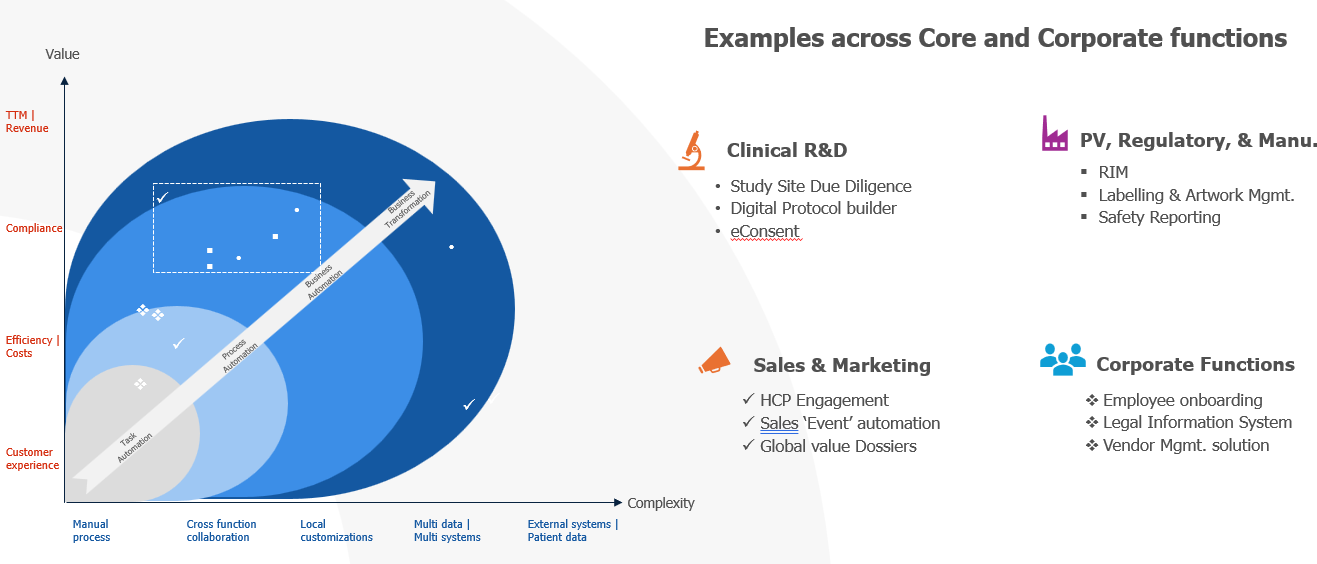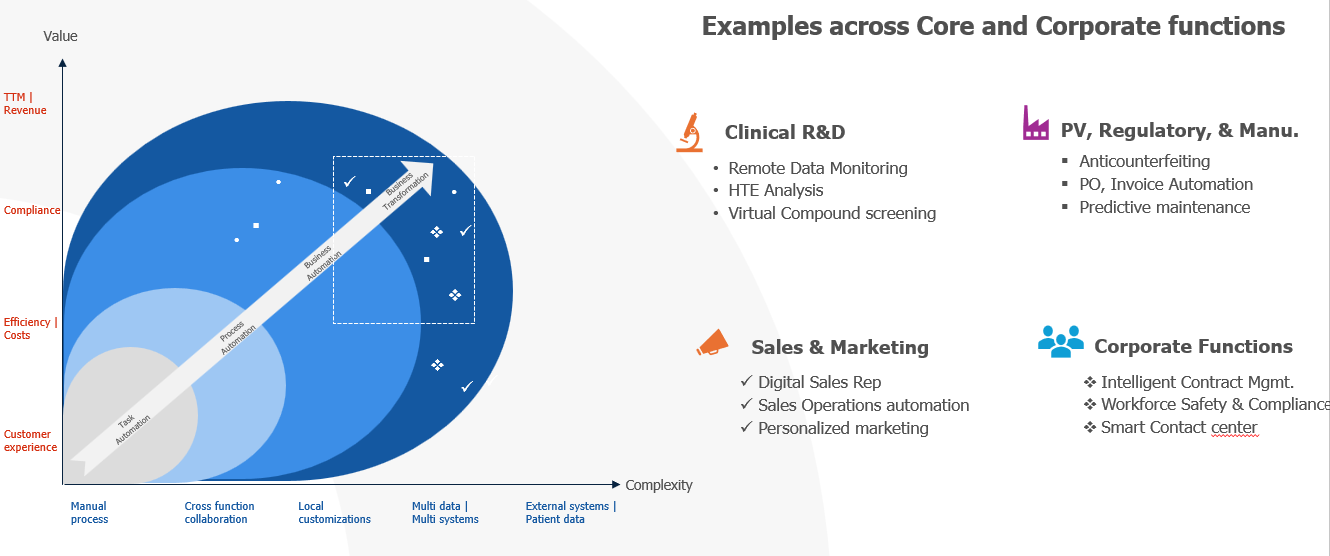Pharma & Life Sciences is a complex industry to navigate, with myriads of hurdles in the form of processes tangled with regulation, and age-old legacy systems. While DPA and automation has become the new normal in a world of digital business, Pharma & Life Sciences organizations have lagged behind. In the age of consumerism, it’s now time to run at the speed of arising opportunities and fully embrace the phenomena of intelligent automation.
Pharma & Life Sciences organizations are at varying maturities when it comes to automation strategy & execution. Some have started this journey by automating manual tasks/processes, many have increased their adoption of BPA tools over COTS for cross-function collaboration, while a few are looking at automation to drive strategic business transformations.
Based on our experience in the Life Sciences industry, we suggest the 'next-best-actions/use cases' for Pharma's to evolve in this journey using a 'Value-Complexity' framework. The 'Value-Complexity' framework is a simple plot of Value perceived by pharma v/s technical complexity associated with automating the process. Generally, business cases associated with revenue growth or accelerated TTM (Time-to-Market) have a higher sense of value, followed by use cases around Compliance, Efficiency / Cost reduction, Customer Experience. The complexity scale is calibrated from low to high complexity tasks/ processes -> manual task/process automation use cases, followed by cross functional collaboration use cases, local customizations use cases, multi data| multi systems integration and finally external systems integration (especially PHI/PII data).
Pharma & Life Sciences organizations who embarked on their DPA journey should target uses cases with medium complexity but fair business & scientific value. We have identified multiple use cases (Refer to Exhibit 1) across Pre /Clinical, Regulatory, Manufacturing, Commercial and Corporate functions which are clustered in this zone. It can help these organizations to implemented and scale DPA across these functions.

Exhibit 1 – Use Cases for Early Adopters of DPA
For early adopters of DPA, who have transitioned from task/process automation to cross functional collaboration & orchestration are looking at intelligent automation & business transformation. These use cases are particularly characterized by integration of multiple data systems, intelligent document processing along with an element of classical / Gen AI to the mix. As seen in Exhibit 2 - these uses have moved across the Value-Complexity spectrum. Organizations can leverage this starter set of use cases to initiate business transformation initiatives.

Considering the impact of the identified use cases to business, Coforge has already started building solutions for a few use cases across the functions.
While use cases form a key part of ‘DPA Roadmap/ Strategy’ there are other important considerations like Structures / Operating Model (COE v/s Product Centric), Data foundation, Technology (End-to-End Tech Stack, Infra/Fin Ops), Talent Upskilling & Change Management which also need to be aligned. Depending on the Pharma / Life Sciences DPA maturity, all these variables need to be addressed as part of overall strategy. We intend to cover these in subsequent articles /blogs.
Coforge, with our deep industry knowledge and core expertise in DPA & intelligent automation, can customise DPA strategy which is aligned with your organisation’s business goals. Through our prebuilt solutions, we address specific automation needs of customers while removing dependency on a single proprietary platform/approach, this allows us to pick and choose from the best and tailor a customised fit for your organisation.
Our dedicated DPA practice (1000+ FTE’s) owns enterprise automation roadmap, enables automation institutionalization across all verticals, manages partnerships and alliances, and explores innovative automation technologies. We maintain an industry leading certification standard which reinforces our partnerships with OEMs; having the highest percent of certified resources across any Pega practice or being consistently ranked 1st in Appian’s A-Score program are testimonies to our partnership commitment.
Conclusion
Pharma & Life Sciences organizations are increasingly adopting digital process automation (DPA) to navigate complex regulatory environments and outdated systems. By leveraging intelligent automation, these organizations can achieve significant business transformations, improve efficiency, and reduce costs. The ‘Value-Complexity’ framework helps identify high-value; medium-complexity use cases that can drive strategic growth. Coforge’s expertise in DPA and intelligent automation, combined with tailored solutions, ensures that organizations can effectively implement and scale automation initiatives. As the industry evolves, embracing these technologies will be crucial for staying competitive and meeting the demands of modern healthcare.






